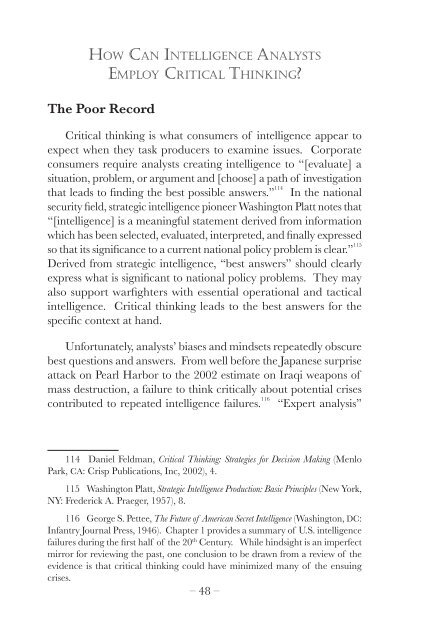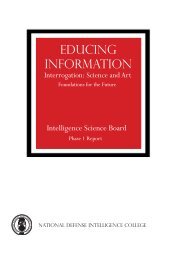Critical Thinking and Intelligence Analysis
Critical Thinking and Intelligence Analysis
Critical Thinking and Intelligence Analysis
Create successful ePaper yourself
Turn your PDF publications into a flip-book with our unique Google optimized e-Paper software.
How Can <strong>Intelligence</strong> Analysts<br />
Employ <strong>Critical</strong> <strong>Thinking</strong><br />
The Poor Record<br />
<strong>Critical</strong> thinking is what consumers of intelligence appear to<br />
expect when they task producers to examine issues. Corporate<br />
consumers require analysts creating intelligence to “[evaluate] a<br />
situation, problem, or argument <strong>and</strong> [choose] a path of investigation<br />
that leads to finding the best possible answers.” 114<br />
In the national<br />
security field, strategic intelligence pioneer Washington Platt notes that<br />
“[intelligence] is a meaningful statement derived from information<br />
which has been selected, evaluated, interpreted, <strong>and</strong> finally expressed<br />
so that its significance to a current national policy problem is clear.” 115<br />
Derived from strategic intelligence, “best answers” should clearly<br />
express what is significant to national policy problems. They may<br />
also support warfighters with essential operational <strong>and</strong> tactical<br />
intelligence. <strong>Critical</strong> thinking leads to the best answers for the<br />
specific context at h<strong>and</strong>.<br />
Unfortunately, analysts’ biases <strong>and</strong> mindsets repeatedly obscure<br />
best questions <strong>and</strong> answers. From well before the Japanese surprise<br />
attack on Pearl Harbor to the 2002 estimate on Iraqi weapons of<br />
mass destruction, a failure to think critically about potential crises<br />
contributed to repeated intelligence failures. 116<br />
“Expert analysis”<br />
114 Daniel Feldman, <strong>Critical</strong> <strong>Thinking</strong>: Strategies for Decision Making (Menlo<br />
Park, CA: Crisp Publications, Inc, 2002), 4.<br />
115 Washington Platt, Strategic <strong>Intelligence</strong> Production: Basic Principles (New York,<br />
NY: Frederick A. Praeger, 1957), 8.<br />
116 George S. Pettee, The Future of American Secret <strong>Intelligence</strong> (Washington, DC:<br />
Infantry Journal Press, 1946). Chapter 1 provides a summary of U.S. intelligence<br />
failures during the first half of the 20 th Century. While hindsight is an imperfect<br />
mirror for reviewing the past, one conclusion to be drawn from a review of the<br />
evidence is that critical thinking could have minimized many of the ensuing<br />
crises.<br />
– 48 –
















